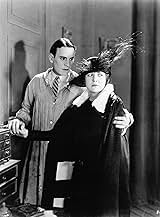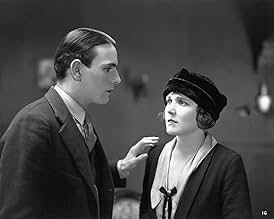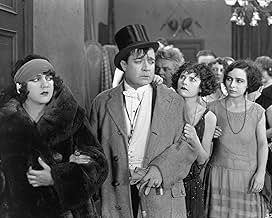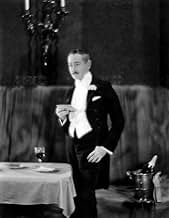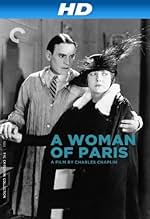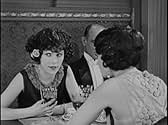AVALIAÇÃO DA IMDb
6,9/10
6,6 mil
SUA AVALIAÇÃO
Uma mulher sustentada pelo marido encontra seu ex-noivo e se vê dividida entre o amor e o conforto.Uma mulher sustentada pelo marido encontra seu ex-noivo e se vê dividida entre o amor e o conforto.Uma mulher sustentada pelo marido encontra seu ex-noivo e se vê dividida entre o amor e o conforto.
- Prêmios
- 3 vitórias no total
Charles K. French
- Jean's Father
- (as Charles French)
Nellie Bly Baker
- Masseuse
- (não creditado)
Henry Bergman
- Head Waiter
- (não creditado)
Charles Chaplin
- Station Porter
- (não creditado)
Frank Coghlan Jr.
- Boy
- (não creditado)
Antonio Corsi
- Accordion Player
- (não creditado)
Harry d'Abbadie d'Arrast
- Man in Nightclub
- (não creditado)
Stella De Lanti
- Revel's Fiancée
- (não confirmado)
- (não creditado)
Jean de Limur
- Man in Nightclub
- (não creditado)
Charles Farrell
- Man in Nightclub
- (não creditado)
Bess Flowers
- Mannequin
- (não creditado)
Avaliações em destaque
Finally saw Woman of Paris: this was a legendary film in its day, but mostly because it was virtually never re-released for sixty years after it premiered in 1923, so the legend grew in its absence. The parts of the story that were not told would have made a better movie than the movie, for example why the lovers' fathers at the beginning of the film are against the marriage, and how Marie (Edna Purviance) became a (shudder) "Woman of Paris" during the year following her departure from her fiance. So I didn't buy the story but the camera work and editing do marvelous things with the story that is there. The melodramatic climax is a bit much to be believed, but not comical as a lot of silent mellers appear today. A little D.W. Griffith (sophisticated early use of photography to tell story and set mood), a little Tolstoy ("bad woman" story contrasted with storyteller's emphasis on happy marriages and wholesome family life), a touch of Dreiser ("sinful" characters shown with realistic insight) and I'd guess a soupcon of Terrence Ratigan (sophisticated attitudes) but I doubt he was around then. The ad copy for this film says Chaplin has a cameo as a railway porter but I didn't notice one in the train scene: I suspect instead he was the ticket agent whose hand appears pointing out the ticket window toward the train. Altogether a satisfying and entertaining film, but the story would have been better if Chaplin had worked on it a little longer.
1923's "A Woman of Paris is probably not what you'd expect in a Chaplin film based on the totality of his body of work, both in features and in shorts. However, that doesn't mean it's not worthwhile viewing. It just means if you are new to Chaplin, you might not want to start here.
"A Woman of Paris" showed Chaplin's talent behind the camera without him appearing in front of it, except for a lone cameo in which he quickly appears and then disappears acting as a luggage boy. He made it for two reasons, to do some pioneering in cinematic technique and to help give his long time costar and companion Edna Purviance a career boost. The film is actually quite good with great performances by Purviance and by Adolphe Menjou as a carefree playboy. The film did make a star out of Menjou. It didn't really help Purviance that much. The film is about a pair of star-crossed lovers that circumstance drives apart and then brings back together and the eventual tragedy that occurs due to the weakness of will of Purviance's character's one time fiancé, played by Carl Miller.
The film was a failure at the box office, not because it was bad, but because audiences expected to see Chaplin when they went to a Chaplin film. After the failure of this film, Chaplin went back to formulas that were tried and true for him and never really went out on a limb experimenting again, which is too bad for all of us.
"A Woman of Paris" showed Chaplin's talent behind the camera without him appearing in front of it, except for a lone cameo in which he quickly appears and then disappears acting as a luggage boy. He made it for two reasons, to do some pioneering in cinematic technique and to help give his long time costar and companion Edna Purviance a career boost. The film is actually quite good with great performances by Purviance and by Adolphe Menjou as a carefree playboy. The film did make a star out of Menjou. It didn't really help Purviance that much. The film is about a pair of star-crossed lovers that circumstance drives apart and then brings back together and the eventual tragedy that occurs due to the weakness of will of Purviance's character's one time fiancé, played by Carl Miller.
The film was a failure at the box office, not because it was bad, but because audiences expected to see Chaplin when they went to a Chaplin film. After the failure of this film, Chaplin went back to formulas that were tried and true for him and never really went out on a limb experimenting again, which is too bad for all of us.
If nothing else, you have to give Charlie Chaplin a lot of credit for taking a shot at something so different from his usual fare. (Though he himself only appears on-screen for a few seconds this time, he did almost everything else in the production.) And while "A Woman of Paris" is certainly a cut below his comedy features, it's a pretty good melodrama, and you'd have to think that with experience Chaplin could have gone on to become almost as effective with straight melodrama as he was with his sentimental comedies. It's not really surprising that after this he returned to comedy for good, but that was just to keep audiences happy, not because he couldn't do drama, since this is a decent effort.
Chaplin's own frequent lady Edna Purviance is convincing as the young woman whose tangled love affairs pull her away from her true love and into a set of tangled relationships in the empty, decadent world of the Parisian idle classes. Except for being rather contrived - there are far too many coincidences and pat developments in the plot, and they do not work as well in serious drama as they would in a comedy - the story is interesting and fairly creative. It does get a bit heavy at times, since there is very little comic relief, but Adolphe Menjou helps keep it from getting unbearably serious with a good performance as the carefree, irresponsible Pierre. He shows that even without dialogue he can make this kind of character lively and memorable.
Since it doesn't quite measure up to the standard of either the best Chaplin features or the best silent melodramas, "A Woman of Paris" may not have a niche of its own, except for its historical interest. But it's quite an interesting change of pace from Chaplin, and an above average movie that's worth seeing.
Chaplin's own frequent lady Edna Purviance is convincing as the young woman whose tangled love affairs pull her away from her true love and into a set of tangled relationships in the empty, decadent world of the Parisian idle classes. Except for being rather contrived - there are far too many coincidences and pat developments in the plot, and they do not work as well in serious drama as they would in a comedy - the story is interesting and fairly creative. It does get a bit heavy at times, since there is very little comic relief, but Adolphe Menjou helps keep it from getting unbearably serious with a good performance as the carefree, irresponsible Pierre. He shows that even without dialogue he can make this kind of character lively and memorable.
Since it doesn't quite measure up to the standard of either the best Chaplin features or the best silent melodramas, "A Woman of Paris" may not have a niche of its own, except for its historical interest. But it's quite an interesting change of pace from Chaplin, and an above average movie that's worth seeing.
This is an exquisite film that needs to be seen with some understanding of the era in which it was made. It was a critical success for good reason, and it's ironic style and subtle acting was a great influence on directors such as Lubitsch. It was not a popular success in the US but was well understood and acclaimed as such in Europe. I notice that some reviewers decry it as melodrama, but there is no reason why melodrama should not be an acceptable form of art. I would urge viewers to immerse themselves more in the treasures of the silent cinematic era, as there are many lessons to be learned therefrom for today's aspiring artists in any medium.
A melodrama rather than the saucy Parisian comedy the title and the name of Charles Chaplin suggests. Promptly withdrawn by its creator, 'A Woman of Paris' was for over half a century one of those films whose reputation was based upon it's unavailability for reappraisal and like many of Chaplin's later films was to prove a disappointment when it was finally revived in the 1970s.
Both the plot and the wardrobe worn by Chaplin's leading lady Edna Purviance evokes the era of Chaplin's fellow United Artist D. W. Griffith rather than the continental sophistication suggested by the title, while the presence of Adolphe Menjou happily anticipates the nascent sophistication of the twenties.
Both the plot and the wardrobe worn by Chaplin's leading lady Edna Purviance evokes the era of Chaplin's fellow United Artist D. W. Griffith rather than the continental sophistication suggested by the title, while the presence of Adolphe Menjou happily anticipates the nascent sophistication of the twenties.
Você sabia?
- CuriosidadesThe reissue of this film, with a musical score and new cut by Sir Charles Chaplin, was the last work of his entire film career. By then, the 87-year-old Chaplin was visibly frail but still walking. His score was aided by arranger Eric James, and he took a small theme from Monsieur Verdoux (1947), but most of the score was Chaplin's. The film was reissued posthumously in 1977 with the new score to overwhelming critical and public praise. At that time, many critics praised it (as in the trailer) as one of the best films ever made.
- Erros de gravaçãoWhen Jean starts fighting with Pierre in the restaurant, Pierre's glass of wine or champagne gets knocked over. When Pierre sits down on the table afterwards, the glass stands on the table filled with drink as if it hadn't been knocked over.
- Citações
[Intertitle]: Time heals, and experience teaches that the secret of happiness is in service to others.
- Versões alternativasDuring 1976, Chaplin was preparing a reissue of A Woman of Paris/Sunnyside but died before completion. The project was completed after his death, and the films were reissued in the United States by Kino International Corp. in 1978. This version, however, dispensed with an opening subtitle, as well as a few brief insert shots.
- ConexõesFeatured in Chaplin Today: Modern Times (2003)
Principais escolhas
Faça login para avaliar e ver a lista de recomendações personalizadas
- How long is A Woman of Paris: A Drama of Fate?Fornecido pela Alexa
Detalhes
- Data de lançamento
- País de origem
- Central de atendimento oficial
- Idioma
- Também conhecido como
- Una mujer de París
- Locações de filme
- Empresa de produção
- Consulte mais créditos da empresa na IMDbPro
Bilheteria
- Orçamento
- US$ 351.000 (estimativa)
- Faturamento bruto mundial
- US$ 12.921
- Tempo de duração1 hora 22 minutos
- Mixagem de som
- Proporção
- 1.33 : 1
Contribua para esta página
Sugerir uma alteração ou adicionar conteúdo ausente

Principal brecha
By what name was Casamento ou Luxo (1923) officially released in India in English?
Responda
